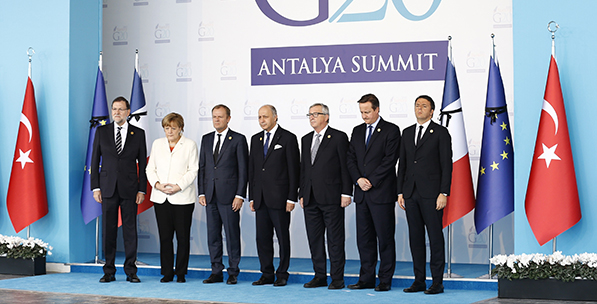The fall of Lehman Brothers is one of the most shocking economic events that the West has experienced since the Great Depression that started in 1929. It was the first sign that showed that the so-called global financial crisis (GFC) would spread around the world. U.S. President George W. Bush called for a G20 Leaders Summit to discuss the fault lines that caused the GFC and to agree on measures to fix them. This was a clever maneuver since this was a global crisis and therefore, the problems should be solved in a coordinated and comprehensive manner.
Since the early 2000s, emerging economies such as China, Brazil, India, South Africa and Turkey made their presence felt in the global economy. Discussing global economic issues at the G8 platform was no longer accurate and constructive. The G20 is a more appropriate platform to discuss how to reform global finance and economy.
So far the G20 has made important progress in reshaping the governance of global finance by implementing macro-prudential policies, developing strict rules on the “too big to fail” problem, increasing the lending capacity of the International Monetary Fund (IMF) and collecting richer information on the shadow banking system.
But this progress is not sufficient. There is still much to be done. Probably the most disappointing topic is IMF reforms. In 2010 the G20 agreed to double the IMF’s total quota resources and redistribute voting power from developed countries to developing countries. But these IMF reforms must be approved by an 85 percent majority of the total voting power in order to be implemented. So far 146 of the 188 members of the IMF with 77.07 percent of the votes have approved these reforms. But this approval is not sufficient because the U.S. voting share is 16.7 percent, making approval by the U.S. necessary. Although U.S. President Barack Obama supports these reforms, Congress is not eager to approve them.
The GFC showed us that we need a credit rating agency system that is more transparent and free from conflict of interest. Moody’s, Standard & Poor’s and Fitch dominate this system globally. There is a strong need for more competition in this system so that it can function more efficiently. G20 country leaders also emphasized the importance of reducing reliance on credit rating agency ratings and of finding alternative ways to quantify risks. However, there has never been a tangible proposal to solve this issue.
Another area in which the decisions of the G20 have been inadequate is building up international safety nets. Although IMF resources had been increased, the current level of international safety nets is not enough to stabilize the global economy. The international financial system should provide stronger international safety nets in order to reduce the tendency of developing countries to accumulate vast amounts of foreign currency reserves, which cause global imbalances and carry social costs.
The slowdown in the pace of global finance reforms is another problem for the G20. Since experiencing partial economic recovery in the U.S., U.K. and Germany, these dominant players’ enthusiasm to reform global finance began to decrease – a sign that their quest for change was not real, but pragmatic and self-centered.
Turkey took over the G20 presidency in an environment in which expectations regarding the G20 have been reduced. Under its presidency, Turkey has tried to increase the G20’s effectiveness by following the principles of the three “I”s: Implementation, investment and inclusiveness. At the last summit in Brisbane, Australia G20 leaders made 1,000 commitments to generate $2 trillion in additional output. The implementation of these commitments is crucial to be more hopeful about the G20 and the global economy.
Slow economic growth is spreading all around the globe as developing countries have performed relatively poor since 2013 compared with the first five years after the GFC. In this environment of sluggish global growth, increasing investments to promote economic growth is an important challenge that the G20 has to address.
The G20 focuses mostly on reforming the global financial system to increase global economic growth. But the world is also experiencing severe socio-economic problems such as increasing income inequality, youth unemployment and gender inequality. These problems increase social tensions and undermine democracy. Therefore, making economic growth more inclusive should be on top of the G20 agenda.
It is important to note that the G20 is not a full-fledged institution. It is a platform without a secretariat. Therefore, the agenda of G20 should not be so overloaded. We hope that the G20’s further achievements will demonstrate the importance of international negotiation, coordination and cooperation and thus eventually pave the way for the democratization of the U.N. system.
[Daily Sabah, November 16, 2015]



